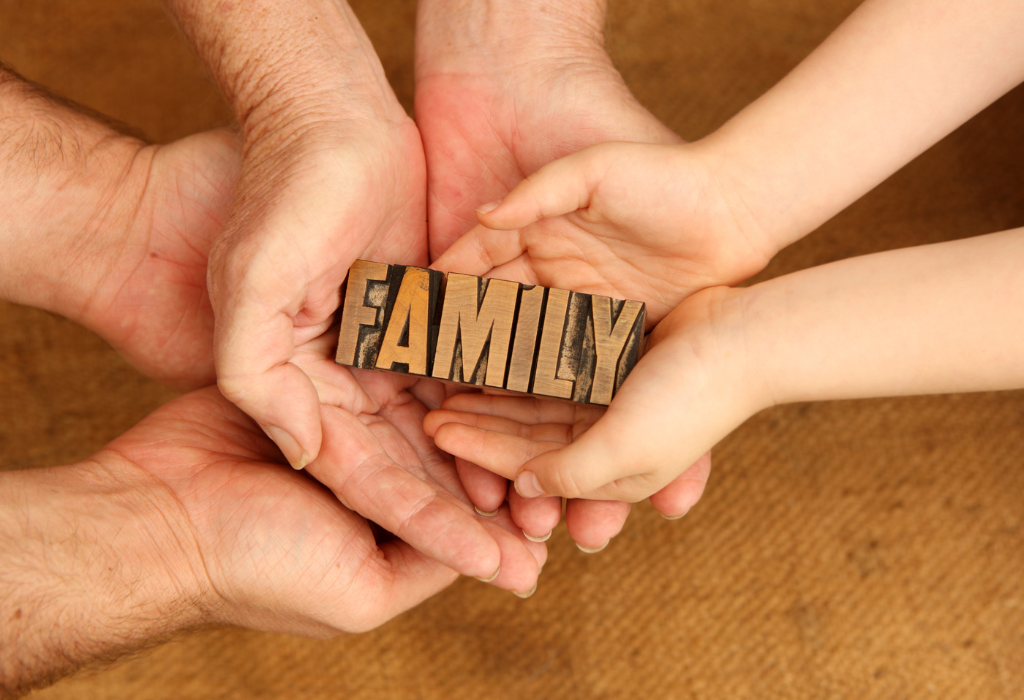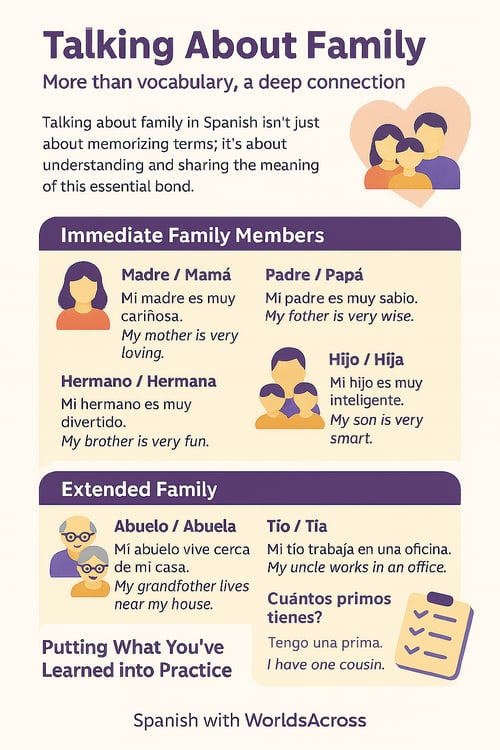Essential Guide: Spanish Family Vocabulary Explained Simply
Family is a topic that’s always present in our lives. Talking about loved ones, the memories we share with them, or their unique traits connects us with those around us. If you’re learning Spanish, you’re probably interested in knowing how to name each member of your family, but you might have come across words like hermanastro or suegro and felt unsure about how to use them. Luckily, in this article, I’ll help you understand and use family vocabulary in Spanish clearly and easily.
Talking About Family: More Than Vocabulary, a Deep Connection
Talking about family in Spanish isn’t just about memorizing terms; it’s about understanding and sharing the meaning of this essential bond. In Hispanic culture, family is more than a group of people; it’s a reflection of values, stories, and traditions.

Why Is It Important to Learn Family Terms in Spanish?
Family terms in Spanish are more than simple words; they are bridges that connect us to the deepest roots of Hispanic culture. Family is a sacred bond, a reflection of love, history, and belonging. Learning how to name and describe each member is fundamental. By knowing and using these terms, you not only immerse yourself in the language but also open doors to closer relationships.
Immediate Family Members
The first terms you should learn are those referring to the closest members of your family—the people you share the most important and everyday moments of your life with. These bonds define, support, and accompany us every step of the way. Talking about them allows you to connect more authentically and personally with others, as they represent a fundamental part of who we are:
- Madre / Mamá: Mother / Mom
- Mi madre es muy cariñosa. (My mother is very loving.)
- Mi mamá siempre me apoya. (My mom always supports me.)
- Padre / Papá: Father / Dad
- Mi padre es muy sabio. (My father is very wise.)
- Mi papá me ayuda con mi tarea. (My dad helps me with my homework.)
- Hermano / Hermana: Brother / Sister
- Mi hermano es muy divertido. (My brother is very fun.)
- Mi hermana es muy amable. (My sister is very kind.)
- Hijo / Hija: Son / Daughter
- Mi hijo es muy inteligente. (My son is very smart.)
- Mi hija ama leer. (My daughter loves to read.)

Extended Family
Beyond parents and siblings, the family extends to those members who, although not always as close, hold a special place in our lives: grandparents, aunts, uncles, and cousins. These relatives share our roots, support us in key moments, and often provide perspectives only older generations can offer. Here are some key terms to talk about them:
- Abuelo / Abuela: Grandfather / Grandmother
- Mi abuelo vive cerca de mi casa. (My grandfather lives near my house.)
- Mi abuela siempre me cuenta historias. (My grandmother always tells me stories.)
- Tío / Tía: Uncle / Aunt
- Mi tío trabaja en una oficina. (My uncle works in an office.)
- Mi tía es una diseñadora increíble. (My aunt is an incredible designer.)
- Primo / Prima: Cousin
- Mi primo es un gran arquitecto. (My male cousin is a great architect.)
- Mi prima estudia medicina. (My female cousin studies medicine.)

Bonds Built with Love
Families today come in many forms, and that’s something beautiful. Sometimes, the people around us aren’t just those we’re related to by blood but those whom life or destiny has brought into our lives. To talk about these diverse families, we use the following family terms in Spanish:
- Madrastra: Stepmother
- Mi madrastra es muy amable. (My stepmother is very kind.)
- Padrastro: Stepfather
- Mi padrastro es un buen hombre. (My stepfather is a good man.)
- Hermanastro / Hermanastra: Stepbrother / Stepsister
- Mi hermanastro canta muy bien. (My stepbrother sings very well.)
- Mi hermanastra es muy simpática. (My stepsister is very friendly.)
- Suegro / Suegra: Father-in-law / Mother-in-law
- Mi suegro es muy buen escritor. (My father-in-law is a very good writer.)
- Mi suegra cocina delicioso. (My mother-in-law cooks deliciously.)
These words allow us to recognize the diverse forms of family that exist, each with its own type of love and connection.
Putting What You’ve Learned into Practice
Now that you know the basic family vocabulary, it’s time to put it into practice. Here are some common questions and answers to help you improve your fluency:
- ¿Tienes hermanos o hermanas? (Do you have siblings?)
- Sí, tengo un hermano. (Yes, I have a brother.)
- ¿Cómo es tu madre o padre? (What is your mother/father like?)
- Mi madre es cariñosa y siempre me apoya. (My mother is caring and always supports me.)
- ¿Cuántos primos tienes? (How many cousins do you have?)
- Tengo una prima. (I have one cousin.)
- Tengo una prima. (I have one cousin.)

Talking About Your Family in Spanish: An Authentic Way to Connect
Talking about family is more than just learning vocabulary—it’s a way to connect with others and share what’s important in our lives. Knowing Spanish family terms will help you express yourself with confidence. Remember, every family has its own story and essence, and talking about it allows you to convey its uniqueness and the richness of the bonds that define it.
At WorldsAcross, we’ll teach you these and many other words so you can express yourself confidently about the topics that matter most: family, friends, work, travel… We’re here to accompany you every step of your Spanish-learning journey!



